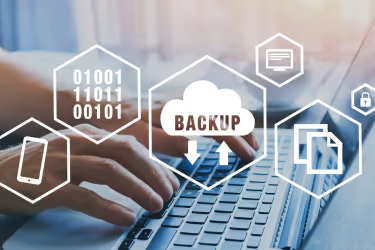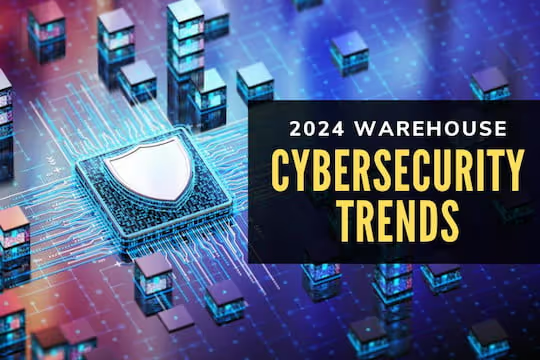Logistics companies and internal warehouse managers frequently focus on the physical security aspects of their areas of responsibility to the detriment of their cyber security posture. The frequency of data breaches and cyber attacks is increasing across the board, and this is especially true for warehouses as supply chain attacks outpace other attack vectors. Despite these facts, you would probably have more success pitching a warehouse manager on the differences between heat treated vs kiln dried pallets than the nuances of the security of operational technology systems and their integration with information technology networks.
Yet, the risks continue to rise, and without a concerted effort to improve security protocols, more and more warehouse management systems and other networks will be compromised by cybercriminals. Cyber security in warehouse operations must become a central tenet of your business continuity plans to have a resilient supply chain. This is true whether you're running warehouse operations for a third-party logistics company or an internal warehouse within a stand-alone enterprise.
Cyber Threat Profile for Warehouses

As the internet expands to include everything from connected thermostats for remote temperature monitoring to biometric access controls or facial recognition-capable security cameras, each of those items becomes a potential access point for an attacker. The infamous Target data breach in 2013 was accomplished by attacking an HVAC contractor with remote access capabilities; this then led to the eventual compromise of their point of sale system and the loss of tens of millions of customers' credit card information to the tune of over $150 million in reparations.
Operational technology like the above is now commonly connected to IT networks that contain critical business information such as customer payment methods, shipping manifests and schedules, and warehouse management systems. A breach of any one of those access points can lead to ransomware infections, data compromise, exfiltration, or the outright theft of materials. With such a diverse threat profile, you can see why cyber security in warehouse operations must be a priority.
Cyber Best Practices
Some of the most common emerging threats include ransomware, phishing attacks, and other virus and malware attacks. To best protect your networks and systems against cyber attacks using these methods, there are several steps that you can take even without being a cyber security expert yourself.
Insurance
You must ensure that your liability insurance is sufficient to cover the loss through theft or damage of your stored goods. The next insurance consideration is the investment in a solid cyber insurance policy or rider. This policy should protect against losses incurred by cyber-attacks even if the negligent actions of one of your employees played an integral role in the attack. Preventing every cyber attack is impossible, so insurance and our next recommendation are essential items in your cyber security strategy.
Incident Response Plan

Shockingly, 77 percent of all security and IT personnel state that they don't have a formal incident response plan. You can't allow that to be the case within your operation. This plan should encompass all aspects of your response to a cyber incident, from who your response team will be to notification procedures for stakeholders and specific response, mitigation, remediation, and recovery steps to be taken. Having a plan in place isn't enough if your staff isn't familiar with it; your employees have to be trained on it. This brings us to our next point.
Implement Cyber Awareness Training
All employees should have a base level of cyber security training, even if that is just at the awareness and policy level. Cyber security policies must be specific and detailed, and your training should be regular and reinforce not just what steps employees need to take when it comes to security protocols but also the reasons why those steps are necessary. Security systems are imperfect, and your personnel can be force multipliers by knowing the warning signs of potential cyber-attacks and the suspicious activity that could indicate that an incident is underway.
Install Updates and Patches

All your software must be regularly updated, and any available patches should be installed immediately. This allows the manufacturers to close known vulnerabilities and ensure your software is as secure from cyber criminals as possible. However, that doesn't negate your responsibility to take extra steps, as even current, updated programs can be compromised by dedicated attackers and uninformed employees.
Invest in Quality Antivirus and Anti-malware Programs
Individual programs to protect against viruses, malware, ransomware, and other threats all exist. Depending on the specific situation facing your enterprise, you may get the best results from a cyber security software suite that includes all of those listed above, as well as active monitoring of your network. Some of the premier offerings utilize artificial intelligence and machine learning to analyze your network traffic, establish a baseline normal traffic level, and identify and escalate behaviors that don't match that normal profile to response personnel. It can be a best-case scenario of implementing security systems that don't tie up staff with additional duties while providing maximum protection.
Backup Files and Databases

If any of these options fail, an up-to-date backup of your databases and critical files kept offline can be worth its weight in gold. Whether corrupted due to malware removal or encrypted and held for ransom, any threat to your data fails to hold water if you have a secure offline backup that is updated at least daily. It removes the temptation to pay a ransom and allows you to continue operations with limited interruption.
Consider Hiring Experts
Whether it's a cyber security consultant offering guidance or a firm managing your security protocols and security systems as a third party, sometimes the best step you can take is relying on the expertise of another. The important step in that decision-making process is doing your due diligence on the organization and crafting a contract that protects your enterprise.
At Pallet Market Inc., we offer new, recycled, and custom pallets in any configuration you desire and in any quantity you need. We also offer pallet recycling services that can salvage up to 99% of broken and unusable pallets because we also care about the environment. The pallet industry is no stranger to the concerns of logistics companies. That's why we've compiled this list of some of the best cybersecurity practices in warehouse operations. If we're willing to take steps like that in a field we aren't experts in, how much effort are we investing in our pallets? We'll even provide a free, no-obligation quote and deliver on your timeline. Contact us today to see what we can provide for your needs.















